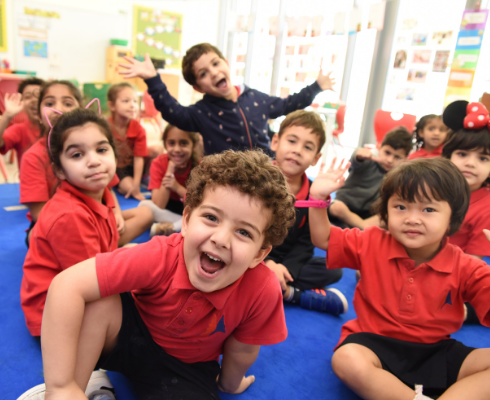
Course Guidance
Early Years Program
The Early Years program (PK - KG1) is based on a creative curriculum centered around five important development strands: social, emotional, physical, cognitive and language. These strands are integrated into themed units throughout the year using interest centers based around drama, science, literature, art, creative play, music, gross-motor, outdoor play and other free-play choices.
Other daily activities to promote developmental skills in all areas include discussions of themes, songs and poems, show-and-tell, stories, games and assembly performances. Students are invited to express their opinions and share their experiences. The teachers encourage participation in all class activities.
The kindergarten classrooms provide opportunities for guided, teacher-led and student-choice activities that focus on joyful play as well as identify cognitive skills for success in school. Activities include:
- Circle time
- Interest areas and center time: drama and creative play, fine-motor activities, arts, music, reading corner, structured play
- Story time
- Gross-motor activities: tricycles, obstacle courses, balance beams
- Outdoor and indoor play
Student assessments are formal and informal. Informal or ongoing assessments include daily observations of each child’s abilities within each developmental strand over time. More formal assessments are undertaken using activities that evaluate specific skills linked to the year-end learning goals.
Elementary School
Grades 1 – 5
The curriculum for students in Grades 1 through 5 emphasizes basic skills in all subject areas and introduces higher-level challenges to students that stimulate their interests. The curriculum fosters the concept that learning is enjoyable and rewarding.
A continuous progress approach used in reading, writing, mathematics, science and social studies allows students to develop at their own rate within a framework of high expectations. In addition to the core subjects, students have classes in physical education (PE), music, art, character education, Arabic language for native and non-native speakers, Islamic education for Muslims, introduction to Spanish and French languages, library and information technology.
Our curriculum makes a variety of provisions to support individual learning. Students have opportunities to demonstrate their many talents, communication skills and leadership qualities through curricular and co-curricular activities.
Teachers encourage and assist students in becoming active learners and integrating their ideas, feelings and experiences into the instructional program. Students are encouraged to accept responsibility for their conduct, thereby enhancing their feelings of self-esteem and self-confidence.
Middle School
Grades 6 – 8
Middle school represents the important transition to adolescence as, during these years, young people are exploring the essential questions of identity, purpose and meaning more deeply than before. At GEMS American Academy Qatar (GAAQ), we complement the core curriculum by including a variety of exploratory classes that make the middle-school experience special. For the first time, students have a choice of which classes to take. They also begin to exercise autonomy while exploring personal interests and possible career choices.
The classes offered in Grades 6 – 8 have been specifically-designed by inspired teachers to engage students in learning opportunities that focus on creating, connecting and collaborating. The core 21st century learning skills are grouped into three strands: Literacies, Competencies and Character Qualities.
High School
Grades 9 – 12
We believe that the recipe for excellence in high school classrooms consist of knowledgeable adults, a focus on classroom culture and a passion for the development of self and others. Within this framework, GAAQ is moving forward in our pursuit to get every student to and through college.
The high school offers a dynamic, college-preparatory education and support systems that encourage student achievement, maturity and independence. On average, GAAQ classes have fewer than 25 students and team and discussion-based learning methods are the norm. All teachers utilize technology to support and enhance their lessons as each classroom is equipped with CTouch technology.






